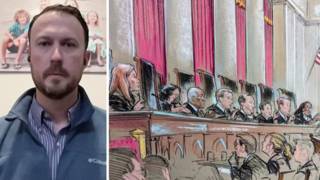Free Speech on Trial: Supreme Court Hears Cases That Could Reshape Future of the Internet

We look at two cases before the Supreme Court that could reshape the future of the internet. Both cases focus on Section 230 of the Communications Decency Act of 1996, which backers say has helped foster free speech online by allowing companies to host content without direct legal liability for what users post. Critics say it has allowed tech platforms to avoid accountability for spreading harmful material. On Tuesday, the justices heard arguments in Gonzalez v. Google, brought by the family of Nohemi Gonzalez, who was killed in the 2015 Paris terror attack. Her family sued Google claiming the company had illegally promoted videos by the Islamic State, which carried out the Paris attack. On Wednesday, justices heard arguments in the case of Twitter v. Taamneh, brought by the family of Nawras Alassaf, who was killed along with 38 others in a 2017 terrorist attack on a nightclub in Turkey. We speak with Aaron Mackey, senior staff attorney with the Electronic Frontier Foundation, who says Section 230 powers the underlying architecture" of the internet.